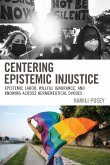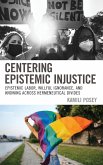Overcoming Epistemic Injustice
Social and Psychological Perspectives
Herausgeber: Sherman, Benjamin R.; Goguen, Stacey
Overcoming Epistemic Injustice
Social and Psychological Perspectives
Herausgeber: Sherman, Benjamin R.; Goguen, Stacey
- Broschiertes Buch
- Merkliste
- Auf die Merkliste
- Bewerten Bewerten
- Teilen
- Produkt teilen
- Produkterinnerung
- Produkterinnerung
This volume draws together cutting edge research from the social sciences to find ways of overcoming the unconscious prejudice that is present in our everyday decisions, a phenomenon coined by the philosopher Miranda Fricker as 'epistemic injustice'.
Andere Kunden interessierten sich auch für
![Overcoming Epistemic Injustice Overcoming Epistemic Injustice]() Overcoming Epistemic Injustice134,99 €
Overcoming Epistemic Injustice134,99 €![Centering Epistemic Injustice Centering Epistemic Injustice]() Kamili PoseyCentering Epistemic Injustice39,99 €
Kamili PoseyCentering Epistemic Injustice39,99 €![Centering Epistemic Injustice Centering Epistemic Injustice]() Kamili PoseyCentering Epistemic Injustice96,99 €
Kamili PoseyCentering Epistemic Injustice96,99 €![Iris Murdoch, Gender and Philosophy Iris Murdoch, Gender and Philosophy]() Sabina LovibondIris Murdoch, Gender and Philosophy167,99 €
Sabina LovibondIris Murdoch, Gender and Philosophy167,99 €![Affective Injustice in Healthcare Affective Injustice in Healthcare]() Brenda BogaertAffective Injustice in Healthcare98,99 €
Brenda BogaertAffective Injustice in Healthcare98,99 €![Epistemic Injustice Epistemic Injustice]() Aidan McGlynnEpistemic Injustice175,99 €
Aidan McGlynnEpistemic Injustice175,99 €![Global Development, Ethics, and Epistemic Injustice Global Development, Ethics, and Epistemic Injustice]() Anna MalavisiGlobal Development, Ethics, and Epistemic Injustice97,99 €
Anna MalavisiGlobal Development, Ethics, and Epistemic Injustice97,99 €-
-
-
This volume draws together cutting edge research from the social sciences to find ways of overcoming the unconscious prejudice that is present in our everyday decisions, a phenomenon coined by the philosopher Miranda Fricker as 'epistemic injustice'.
Produktdetails
- Produktdetails
- Verlag: Rowman & Littlefield Publishers
- Seitenzahl: 334
- Erscheinungstermin: 27. Juni 2019
- Englisch
- Abmessung: 229mm x 152mm x 20mm
- Gewicht: 544g
- ISBN-13: 9781786607065
- ISBN-10: 1786607069
- Artikelnr.: 55496906
- Herstellerkennzeichnung
- Libri GmbH
- Europaallee 1
- 36244 Bad Hersfeld
- gpsr@libri.de
- Verlag: Rowman & Littlefield Publishers
- Seitenzahl: 334
- Erscheinungstermin: 27. Juni 2019
- Englisch
- Abmessung: 229mm x 152mm x 20mm
- Gewicht: 544g
- ISBN-13: 9781786607065
- ISBN-10: 1786607069
- Artikelnr.: 55496906
- Herstellerkennzeichnung
- Libri GmbH
- Europaallee 1
- 36244 Bad Hersfeld
- gpsr@libri.de
Benjamin R. Sherman is a visiting research scholar at Brandeis University, specializing in ethics, epistemology, and the overlap between the two fields. Stacey Goguen is an Assistant Professor of philosophy at Northeastern Illinois University, specializing in feminist philosophy, philosophy of science, and social epistemology.
Introduction Ben Sherman / Part I: Managing Psychological Tendencies/1.
Negative Epistemic Exemplars Emily Sullivan and Mark Alfano / 2. Positive
Stereotypes: Unexpected Allies or Devil's Bargain? Stacey Goguen / 3.
Conceptualizing Consent: Hermeneutical Injustice and Epistemic Resources
Audrey Yap / 4. Structural Thinking and Epistemic Injustice Nadya Vasilyeva
and Saray Ayala-López / 5. The Inevitability of Aiming for Virtue Alex
Madva / 6. Can Epistemic Virtues Help Combat Epistemologies of Ignorance?
Emily McWilliams / Part II: Curing Epistemic Injustice in Healthcare/ 7.
Epistemic Microaggressions and Epistemic Injustices in Clinical Medicine
Lauren Freeman and Heather Stewart / 8. Returning to the "There Is": PTSD,
Phenomenology, and Systems of Knowing MaryCatherine McDonald / 9.
Pathocentric Epistemic Injustice and Conceptions of Health Ian Kidd and
Havi Carel / 10. Uncovering Prejudice and Where It Lives: Stereotype
Mapping in Professional Domains Elianna Fetterolf / 11. Epistemic Injustice
in Careers: Insights from a Study with Women Surgeons Katrina Hutchison /
Part III: Arresting Epistemic Injustice in the Legal and Correctional
Systems / 12. The Episteme, Epistemic injustice, and the Limits of White
Sensibility Lissa Skitolsky /13. Carceral Medicine and Prison Abolition:
Trust and Truth-telling in Correctional Healthcare Andrea J. Pitts / 14.
Epistemic Injustice and Medical Neglect in Ontario Jails: The Case of
Pregnant Women Harry Critchley / Part IV: Learning to Overcome Epistemic
Injustice in Academia, Education, and Sports / 15. Teaching as Epistemic
Care Casey Rebecca Johnson /16. When Testimony Isn't Enough: Implicit Bias
Research as Epistemic Exclusion Lacey J. Davidson / 17. Gaslighting as
Epistemic Violence: "Allies," Mobbing, and Complex Posttraumatic Stress
Disorder, Including a Case Study of Harassment of Transgender Women in
Sport Rachel McKinnon /
19. Afterword Miranda Fricker / Index / About the Contributors
Negative Epistemic Exemplars Emily Sullivan and Mark Alfano / 2. Positive
Stereotypes: Unexpected Allies or Devil's Bargain? Stacey Goguen / 3.
Conceptualizing Consent: Hermeneutical Injustice and Epistemic Resources
Audrey Yap / 4. Structural Thinking and Epistemic Injustice Nadya Vasilyeva
and Saray Ayala-López / 5. The Inevitability of Aiming for Virtue Alex
Madva / 6. Can Epistemic Virtues Help Combat Epistemologies of Ignorance?
Emily McWilliams / Part II: Curing Epistemic Injustice in Healthcare/ 7.
Epistemic Microaggressions and Epistemic Injustices in Clinical Medicine
Lauren Freeman and Heather Stewart / 8. Returning to the "There Is": PTSD,
Phenomenology, and Systems of Knowing MaryCatherine McDonald / 9.
Pathocentric Epistemic Injustice and Conceptions of Health Ian Kidd and
Havi Carel / 10. Uncovering Prejudice and Where It Lives: Stereotype
Mapping in Professional Domains Elianna Fetterolf / 11. Epistemic Injustice
in Careers: Insights from a Study with Women Surgeons Katrina Hutchison /
Part III: Arresting Epistemic Injustice in the Legal and Correctional
Systems / 12. The Episteme, Epistemic injustice, and the Limits of White
Sensibility Lissa Skitolsky /13. Carceral Medicine and Prison Abolition:
Trust and Truth-telling in Correctional Healthcare Andrea J. Pitts / 14.
Epistemic Injustice and Medical Neglect in Ontario Jails: The Case of
Pregnant Women Harry Critchley / Part IV: Learning to Overcome Epistemic
Injustice in Academia, Education, and Sports / 15. Teaching as Epistemic
Care Casey Rebecca Johnson /16. When Testimony Isn't Enough: Implicit Bias
Research as Epistemic Exclusion Lacey J. Davidson / 17. Gaslighting as
Epistemic Violence: "Allies," Mobbing, and Complex Posttraumatic Stress
Disorder, Including a Case Study of Harassment of Transgender Women in
Sport Rachel McKinnon /
19. Afterword Miranda Fricker / Index / About the Contributors
Introduction Ben Sherman / Part I: Managing Psychological Tendencies/1.
Negative Epistemic Exemplars Emily Sullivan and Mark Alfano / 2. Positive
Stereotypes: Unexpected Allies or Devil's Bargain? Stacey Goguen / 3.
Conceptualizing Consent: Hermeneutical Injustice and Epistemic Resources
Audrey Yap / 4. Structural Thinking and Epistemic Injustice Nadya Vasilyeva
and Saray Ayala-López / 5. The Inevitability of Aiming for Virtue Alex
Madva / 6. Can Epistemic Virtues Help Combat Epistemologies of Ignorance?
Emily McWilliams / Part II: Curing Epistemic Injustice in Healthcare/ 7.
Epistemic Microaggressions and Epistemic Injustices in Clinical Medicine
Lauren Freeman and Heather Stewart / 8. Returning to the "There Is": PTSD,
Phenomenology, and Systems of Knowing MaryCatherine McDonald / 9.
Pathocentric Epistemic Injustice and Conceptions of Health Ian Kidd and
Havi Carel / 10. Uncovering Prejudice and Where It Lives: Stereotype
Mapping in Professional Domains Elianna Fetterolf / 11. Epistemic Injustice
in Careers: Insights from a Study with Women Surgeons Katrina Hutchison /
Part III: Arresting Epistemic Injustice in the Legal and Correctional
Systems / 12. The Episteme, Epistemic injustice, and the Limits of White
Sensibility Lissa Skitolsky /13. Carceral Medicine and Prison Abolition:
Trust and Truth-telling in Correctional Healthcare Andrea J. Pitts / 14.
Epistemic Injustice and Medical Neglect in Ontario Jails: The Case of
Pregnant Women Harry Critchley / Part IV: Learning to Overcome Epistemic
Injustice in Academia, Education, and Sports / 15. Teaching as Epistemic
Care Casey Rebecca Johnson /16. When Testimony Isn't Enough: Implicit Bias
Research as Epistemic Exclusion Lacey J. Davidson / 17. Gaslighting as
Epistemic Violence: "Allies," Mobbing, and Complex Posttraumatic Stress
Disorder, Including a Case Study of Harassment of Transgender Women in
Sport Rachel McKinnon /
19. Afterword Miranda Fricker / Index / About the Contributors
Negative Epistemic Exemplars Emily Sullivan and Mark Alfano / 2. Positive
Stereotypes: Unexpected Allies or Devil's Bargain? Stacey Goguen / 3.
Conceptualizing Consent: Hermeneutical Injustice and Epistemic Resources
Audrey Yap / 4. Structural Thinking and Epistemic Injustice Nadya Vasilyeva
and Saray Ayala-López / 5. The Inevitability of Aiming for Virtue Alex
Madva / 6. Can Epistemic Virtues Help Combat Epistemologies of Ignorance?
Emily McWilliams / Part II: Curing Epistemic Injustice in Healthcare/ 7.
Epistemic Microaggressions and Epistemic Injustices in Clinical Medicine
Lauren Freeman and Heather Stewart / 8. Returning to the "There Is": PTSD,
Phenomenology, and Systems of Knowing MaryCatherine McDonald / 9.
Pathocentric Epistemic Injustice and Conceptions of Health Ian Kidd and
Havi Carel / 10. Uncovering Prejudice and Where It Lives: Stereotype
Mapping in Professional Domains Elianna Fetterolf / 11. Epistemic Injustice
in Careers: Insights from a Study with Women Surgeons Katrina Hutchison /
Part III: Arresting Epistemic Injustice in the Legal and Correctional
Systems / 12. The Episteme, Epistemic injustice, and the Limits of White
Sensibility Lissa Skitolsky /13. Carceral Medicine and Prison Abolition:
Trust and Truth-telling in Correctional Healthcare Andrea J. Pitts / 14.
Epistemic Injustice and Medical Neglect in Ontario Jails: The Case of
Pregnant Women Harry Critchley / Part IV: Learning to Overcome Epistemic
Injustice in Academia, Education, and Sports / 15. Teaching as Epistemic
Care Casey Rebecca Johnson /16. When Testimony Isn't Enough: Implicit Bias
Research as Epistemic Exclusion Lacey J. Davidson / 17. Gaslighting as
Epistemic Violence: "Allies," Mobbing, and Complex Posttraumatic Stress
Disorder, Including a Case Study of Harassment of Transgender Women in
Sport Rachel McKinnon /
19. Afterword Miranda Fricker / Index / About the Contributors









